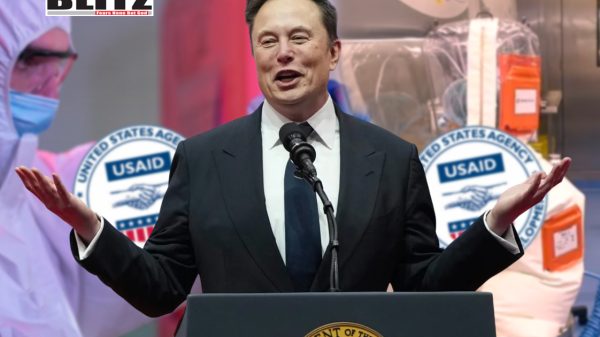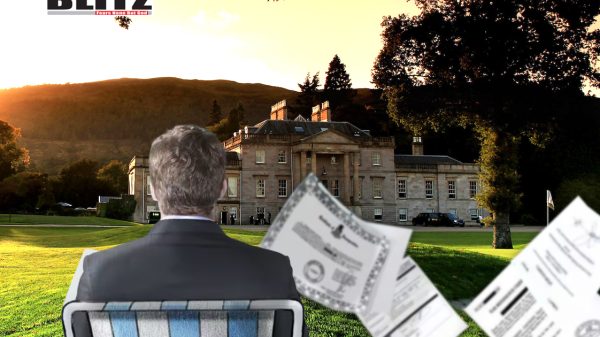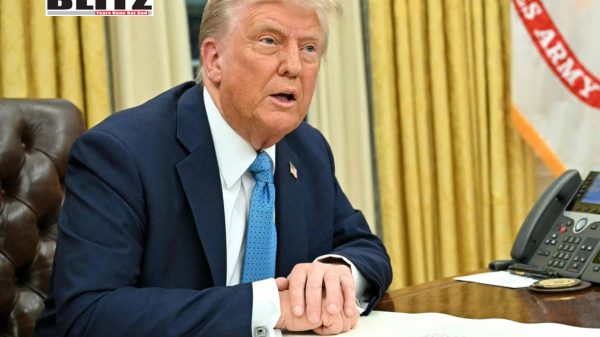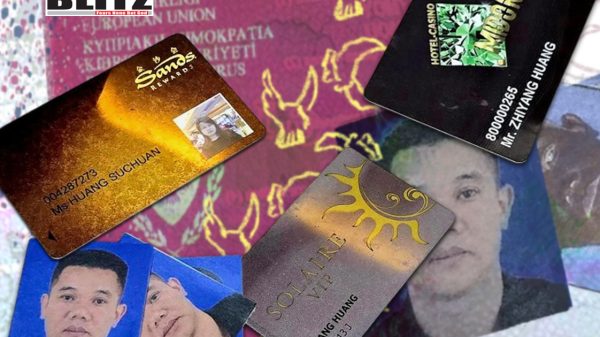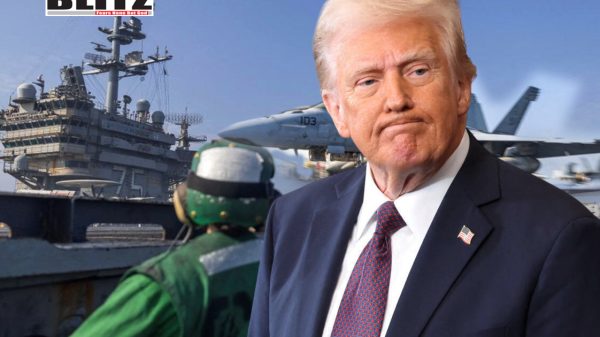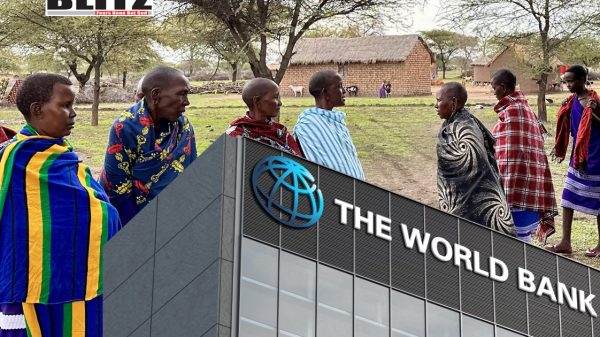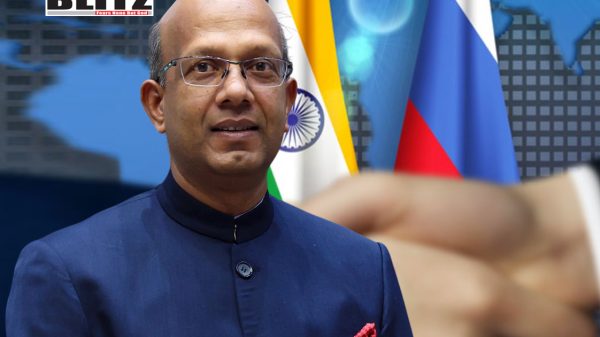Hizb Ut Tahrir poses serious security threats by expanding like hellfire in Bangladesh
- Update Time : Tuesday, February 4, 2025
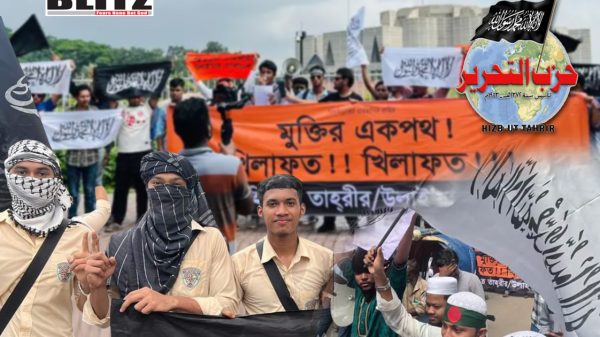
Hizb Ut Tahrir (HuT), a pan-Islamic terrorist organization that denounces democracy, advocates Caliphate rule, and rejects the empowerment of women, has been expanding its footprint in Bangladesh for decades in a slow and deceptive manner. However, following the August 2024 regime change – blueprinted by Obama, the Clintons, George Soros, the Deep State, and Pakistan’s ISI – HuT’s expansion has accelerated at an alarming rate, posing serious security threats to Bangladesh, neighboring India, and other nations in the region, including Nepal, Bhutan, Sri Lanka, Myanmar, and Thailand.
For decades, activities of Hizb Ut Tahrir remained largely contained and controlled by successive governments led by the Bangladesh Nationalist Party (BNP), Awami League (AL), and even military rulers such as Gen. Hussain Muhammad Ershad and the military-backed government that seized power on January 11, 2007. During these years, HuT activists struggled to operate, and in 2009, the Awami League government banned HuT, designating it a terrorist entity. Although forced underground, HuT continued recruiting members from various educational institutions, especially English medium schools, private colleges, and universities. Credible allegations suggest that HuT has also succeeded in recruiting young military officers or cadets.
In addition to advocating for a Caliphate, Hizb Ut Tahrir is notorious for promoting antisemitism, anti-India, and anti-Hindu narratives while portraying Pakistan as a “model nation for the Muslim ummah”. It publicly defends Hamas and other militant forces, supporting extremist agendas such as wiping Israel off the global map and destroying the United States, branding both nations as “enemies of Allah”.
Since the partition of India in 1947 and the creation of Pakistan, Pakistani rulers and elites have continued to fuel religious hatred towards Hindus, Christians, Buddhists, and other non-Muslims while depicting India as an “enemy of Islam”. Although East Pakistan achieved independence from West Pakistan after a brutal nine-month war in which Pakistani forces committed genocide against Bengalis – Muslims, Hindus, Christians, and Buddhists alike -Pakistan and its radical ideology continued to influence Bangladesh. Radical Islam flourished, particularly through madrassas and Arab-funded NGOs. The military regimes of General Ziaur Rahman and General Hussain Muhammad Ershad played a significant role in fostering radical Islam, spreading jihadist ideology primarily among the uneducated and madrassa students. These regimes also openly supported Palestinian militants, nurturing antisemitism and Israel-hatred, which enabled jihadist groups like Hizb Ut Tahrir to expand their influence in Bangladesh.
Despite being ruled for over two decades by the Awami League – a party claiming to uphold secularism but whose leaders harbored jihadist and antisemitic ideologies – HuT’s influence has continued to rise.
Hizb Ut Tahrir became increasingly emboldened in its agenda to turn Bangladesh into a Caliphate following the military-backed Islamist-jihadist coup. The organization intensified its activities within the civil-military administration and the government. Muhammad Yunus, once perceived as “secular” for his support of LGBTQ rights, suddenly transformed into a neo-Khomeini figure, openly advocating for the disintegration of India and the transformation of Bangladesh into a Caliphate. He ignored calls from US political figures, including Donald Trump and Tulsi Gabbard, to cease persecution against Hindus, Christians, and religious minorities. Disturbingly, European leaders turned a blind eye to the Yunus regime’s ongoing genocide against non-Muslim communities, emboldening his radical policies.
Meanwhile, Hizb Ut Tahrir has been openly denouncing democracy and women’s empowerment. During a recent rally in Dhaka, the group called for the establishment of a Caliphate, raising serious concerns about national and regional security. Given HuT’s deep-rooted ties to extremist networks, its resurgence is a grave threat to political stability and global security.
Hizb Ut Tahrir is banned in multiple countries, including the United Kingdom, India, China, Russia, Germany, Turkey, Central Asia, Indonesia, and various Arab nations due to its extremist ideology and terrorist links. Nevertheless, it continues to operate in some countries, promoting its agenda through deception and propaganda.
Reports indicate that in the aftermath of the political upheaval that led to the ouster of former Prime Minister Sheikh Hasina, the Yunus administration ordered the release of several Islamic militants, including HuT members, from Bangladeshi prisons. Moreover, more than 100 militants from HuT and Ansarullah Bangla Team – later renamed Ansar Al Islam – have been recruited into law enforcement agencies, with similar efforts underway to infiltrate the Bangladesh Armed Forces and Border Guard Bangladesh (BGB). Ansar Al Islam is known as the local franchise of Al Qaeda.
Most alarmingly, a significant number of HuT and Ansar Al Islam operatives have been dispatched to Bangladeshi diplomatic missions abroad, including in the United States, Russia, China, Germany, France, and Central Asia. Under the cover of diplomatic immunity, these individuals could execute terrorist plots targeting individuals, institutions, and strategic establishments in these countries.
On September 9, 2024, Hizb Ut Tahrir formally applied to Bangladesh’s Ministry of Home Affairs for the removal of the ban imposed in 2009, claiming it was “politically motivated”. In October, HuT members held a meeting with Hefazat-e-Islam (HeI), another pro-Caliphate group, which agreed to lobby for lifting the ban and assist HuT in recruitment efforts. HuT has also forged ties with Tablighi Jamaat, using it as a vessel for recruitment.
In an interview with BBC Bangla on September 13, HuT’s media coordinator, Imtiaz Salim, emphasized that HuT is an ideology-based Islamic political organization and not a militant or terrorist group. This statement is part of HuT’s attempt to present itself in a more positive light and distance itself from any associations with violence or terrorism. It’s a complex situation, as these social programs can be seen as a way to gain public support and legitimacy, while their ideological goals remain unchanged.
Hizb ut-Tahrir has established a WhatsApp group called “Prabaashi Muslim Network” to unite its UK-based members of Bangladeshi, Indian, and Pakistani origin. This network serves as a strategic platform to consolidate support within the diaspora community and advance HuT’s objective of establishing a pro-Islamic government in Bangladesh.
The resurgence of Hizb Ut Tahrir in Bangladesh is not just a national issue but a severe global security threat. The group’s extremist agenda, combined with its deep-rooted affiliations with terrorist organizations, poses an immediate danger to South Asia and beyond. If left unchecked, HuT’s expansion could lead to the establishment of a radical Islamist state, destabilizing the region and providing a haven for jihadist networks.
For the Trump administration and the international community, tackling this threat must be a priority. President Trump has several strategic levers at his disposal to pressure the Yunus regime into taking decisive action against Hizb Ut Tahrir. These include economic sanctions, targeted visa bans, and freezing assets of key regime figures complicit in supporting HuT. Additionally, the US can leverage its influence within international financial institutions, such as the IMF and World Bank, to restrict financial aid to Bangladesh until it takes concrete steps against jihadist elements.
Washington must also strengthen security cooperation with India, Japan, and ASEAN nations to counter the growing threat posed by HuT and other Islamist terror outfits. Intelligence-sharing agreements and coordinated counterterrorism operations will be crucial in dismantling HuT’s networks before they pose a greater global risk.
Failure to act now will have dire consequences. The continued spread of HuT’s ideology will embolden other radical groups, fueling instability and increasing the likelihood of terrorist attacks worldwide. The international community, led by President Trump, must take urgent and decisive action to halt the resurgence of Hizb Ut Tahrir in Bangladesh before it spirals into a catastrophic security crisis.


